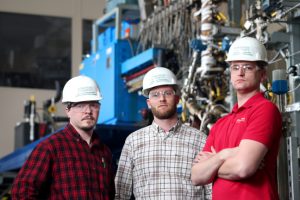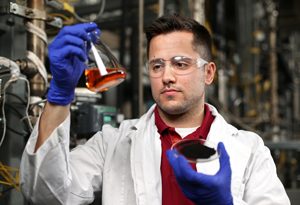Iowa State BioCentury Research Farm has entered into a joint project with Chervon, U.S.A. University engineers to develop a pilot plant to develop and demonstrate solvent liquefaction, an advanced biorenewables technology. The technology converts biomass into a bio-oil that can then be processed into biofuels or biochemicals and biochar, a fertilizer that has the ability to enrich soil. Iowa State University (ISU) obtained a $3.5 million grant from the U.S. DOE’s Biomass Research and Development Initiative.

Lysle Whitmer, Ryan Smith and Martin Haverly, left to right, led the development of a pilot plant as part of a joint biofuels project with Chevron U.S.A. Larger photo. Photos by Christopher Gannon.
The pilot includes a bio-oil production line that includes a 55-gallon solvent tank attached to a twin-screw extruder that mixes, chops, heats and pressurizes that is attached to a reactor. Also included in the mix are product separators and a solvent recycling system.
“This is the culmination of everything we’ve learned about building pilot plants in the past 10 years,” said Lysle Whitmer, senior thermochemical research engineer for the Institute. “This is really a gem that represents everything we’ve learned thus far.”
The project actually began in 2013 when Chevron moved its $1.4 million Small Continuous Liquefaction Unit from Houston to the research farm for the Institute to assist in converting the plant to continuous production. In addition, Chevron was looking for a system to be built to recycle the solvent back into the production process.

Taylor Schulz analyzes the bio-oil and biochar produced by the pilot plant. Photo credit: Christopher Gannon.
“Our modular approach to the plant design allowed for a fair amount of prototyping and proof-of-concept experiments along the way,” explained Martin Haverly, a doctoral student in mechanical engineering and the lead design engineer for the project. “The system is a blend of commercially available products and custom solutions, all tied together at an industrially relevant scale. “All of these efforts helped us end up where we are now, with a safe and functioning pilot plant.”
Robert Brown, director of the Institute noted that the plant functions similar to a mini commercial system. One of the challenges of the pilot plant was to ensure all the steps worked together and operated in harmony. While elements of the system existed, the research team is now working on putting them all together. The engineers have now demonstrated the viability of every one of the pilot plant’s operations but they are still working to efficiently and simultaneously run all the operations. The initial result is a process that produces a bio-oil from wood chips that is low in oxygen and therefore more stable than other bio-oils. Next steps may include working with new feedstocks to create high-value, biorenewable chemicals.

